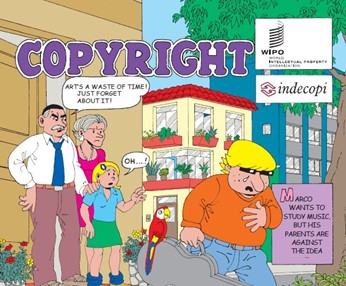FOREIGN APPROACH TO COPYRIGHT INFRINGEMENT BY CHILDREN

The situation of copyright infringement by children abroad is very similar to the Czech Republic. A significant portion of the public here is not aware of the benefits that the protection of copyright and related rights brings to culture and the economy. Ironically, piracy is thus often regarded as acceptable behaviour on the grounds that if it is widespread, it cannot be illegal. And this parents’ misconception is unfortunately being adopted by their children.
Different countries have taken different approaches to the fight against illegal sharing of copyright works. But there is one thing they agree on. Education is essential for children and young people. This is the only way to raise a new generation that is well aware of the harm caused by pirate downloading and sharing, that is willing to comply with the law, and that will pass these attitudes on to their children. How do different countries approach the education of children and young people?
Greece
In 2014, the Hellenic Copyright Organisation (HCO) developed an educational programme for schools in cooperation with a working group of educators. In the same year, HCO organised a series of seminars to promote the programme, targeting both the regional officials in charge of the schools and the teachers who can select and implement the educational programme in their classrooms.
Greek Copyright School
In 2015, HCO received a grant from the EUIPO to launch the “Greek Copyright School” programme, comprising five core activities:
- Printing of information materials and their distribution to teachers and pupils.
- Organisation and delivery of training courses and seminars in many Greek cities.
- Development and design of websites categorised for individual target segments (primary school pupils, secondary school students, teachers, and parents).
- Development of electronic educational games.
- Creation of a short, animated film on the importance of protecting copyright and related rights.
The Greek Copyright School was an inspiration for other countries
The implementation of the “Greek Copyright School” was a great success not only in terms of the quality of the materials produced but also in terms of the warm response that teachers and students expressed during and after their personal participation in the programme. The programme has also received accolades abroad. It has been presented as a model in its field four times at EUIPO meetings and forums and once at a one-day conference organised by the World Intellectual Property Organisation (WIPO).
Copyrightschool.gr portal
The copyrightschool.gr website is divided into four sections according to the target segments for which the information is intended
- primary school pupils
- secondary school students
- teachers
- parents.
In the media library, all games, videos, infographics, guides, posters, FAQs, presentations, and other useful information are available in aggregate, regardless of the target segment. The news page provides an overview of the latest and planned events.

The sections for pupils, students, and teachers have an identical structure and their content always corresponds to the age of the users. The section for parents is in text form and aims to answer parents’ common questions on copyright and how to communicate this information to their children. Thanks to comic strips, quizzes, crosswords, games, and other interactive elements, the website is pleasant and lively and can effectively reach the target audience. A great example is an educational game based on the redesign of an octopus.
enjoylegal.gr portal
The enjoy legal portal was also initiated by the HCO. It aims to inform the Greek public about online platforms that legally offer copyrighted content. In other words, HCO collects and provides users with online platforms where they can legally watch or download movies, series, and sports events, listen to or download music, read online or download books, and access images and video games. The enjoy legal portal is a member of the agorateka network.
The agorateka portal was launched by the European Union Intellectual Property Office (EUIPO). It is a gateway to national portals providing quick and easy access to legal content offers - music, films and TV shows, e-books, video games, or sporting events. Currently, 24 countries participate in the agorateka project, comprising 107 platforms with links to more than 3,400 sites offering legal copyrighted content. In the Czech Republic, the project has been joined by portals such as FILMTORO, Pro-music Czech Republic and SROC Czech Republic.
Great Britain
Similar to the Czech Republic, stakeholders in England address the problem of cybercrime mainly through information portals.
Internet Matters
Internet Matters is a small non-profit organisation with a wide reach. It brings together a number of talented individuals who are committed to keeping children safe online and strive to help parents, caregivers, and educators stay up to date on the latest research and trends in digital safety.
The organisation has developed and operates a comprehensive portal offering guides and resources on safe internet. Advice is divided by age (0-5 years, 6-10 years, 11-13 years, 14+ years) as children’s online behaviour differs at different ages. And the risks to which different age groups are predominantly exposed also vary.
In addition to piracy, the organisation focuses on a range of other issues such as online hate, sexting, online grooming, fake news, screen time, inappropriate content, cyberbullying, online reputation, online pornography, self-harm, radicalisation, privacy, and identity theft.
In the section on piracy, there are statistics, risk descriptions, videos with parents’ opinions, children’s opinions to understand children’s perspectives and perceptions of the issue, links to articles related to the topic, “guides” focused on specific sub-issues (illegal downloads, viruses, etc.), safety tips and advice for parents on how to ensure safe access to content for their children and recommended additional sources of information.
The Industry Trust
Another organisation involved in addressing illegal downloading in the UK is The Industry Trust. This UK film, TV, and video consumer education organisation promotes the value of copyright and creativity. It aims to tackle the persistent problem of copyright infringement of films and TV programmes by inspiring viewers to appreciate great film moments and choose to watch films, TV programmes, and videos from legal sources.
It currently has more than 40 members, including distributors, cinemas, and online and offline retailers.
In collaboration with the film education charity Into Film, the organisation has developed educational material for teachers and pupils. This educational material is designed for pupils aged 7-14. It aims to highlight how to stay safe when accessing film and TV content online, while also introducing them to different types of malware and their effects, including webcam hacking, personal data leaks, and online blackmail. It calls on young people, parents, educators, social workers, law enforcement bodies, businesses, public officials, and the wider public to work together to create a better internet.
Germany
In Germany, the state media office Mediaanstalt NRW has developed an internet awareness PDF for parents. The rather comprehensive material covers various topics on child protection on the internet and is a practical and useful guide for parents of children of different ages.
Another work focusing on the topic of a safe internet is the publication Nicht alles, was geht, ist auch erlaubt. This booklet, which could be translated into English as Not everything that is possible is also allowed, provides internet users with the most important information on copyright and personality rights and the associated liability risks. In 2015, the brochure was expanded to include the topic of liability for illegal downloading by minors.
Verbrauchszentrale
Parents who are concerned about the penalties resulting from illegal downloading of content by their children are being targeted by the Verbrauchszentrale - the Federal Consumer Association. This organisation offers parents guidance in the form of best practice.
An essential piece of information for parents who are concerned about liability for their children’s illegal downloading on the internet is that they need to inform their children about the legal situation regarding copyright.
Parents in Germany who want to avoid liability must be able to prove in the event of a lawsuit that they have sufficiently informed their children about the prohibition on downloading and distributing copyrighted material. This means that they should note the date of such a conversation with the children as well as the content discussed. During a conversation about copyright infringement, parents should discuss all the dangers, prohibitions, and legal conditions in a child-friendly way and establish appropriate rules of conduct.
However, the website also states that, depending on the developmental maturity of the child, such a discussion makes sense from the age of 12 at the latest, while in theory both parents and children can be held responsible at a younger age.
Conclusion
All EU countries face the same problem of a lack of awareness of copyright and illegal downloading and sharing of content. Each country approaches the problem in its own way and focuses on different areas for solutions. The Greek model, with its Greek Copyright School, shows the importance of creating a structured and attractive educational programme including printed materials, seminars, and interactive online tools, and combining different forms and approaches to make education effective and fun for all ages. Britain can inspire with its emphasis on collaboration with non-profit organisations and the use of multimedia resources. The German model, with its emphasis on parental responsibility and prevention through informed conversations, may in turn encourage other countries to develop specific information campaigns for parents.
It is therefore extremely important for countries to inspire each other and share best practices. It is also important to exchange experiences and materials that can be adapted to the specific needs of each country. The use of effective elements from individual countries and the integration of best practices from abroad can also help establish an effective, sustainable educational programme in the Czech Republic, which will contribute to reducing the level of copyright infringement among children and young people.



